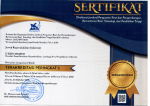CORRUPTION IN ACESSING AND UTILIZING THE COMMON PROPERTY RESOURCES IN INDONESIA
Abstract
This article reviews some corruption cases that are associated with natural resources management, especially in accessing and utilizing common property resources in Indonesia. It attempts to extract lessons from regulations and actions that have emerged in all levels and across many sectors. This article develops social-ecological systems (SES) framework to deliver a clear roadmap for incorporating more ecological or natural characteristics into studies that explores linkage social and legal systems. The framework therefore considers how problems are deï¬ned and how action and policy are formulated to deal with these problems. This article provides an in-depth investigation in Pasaman district. The data is gathered by interviewing local people who live around palm plantations in West Pasaman. Corruption in the context of managing common property resources brings many disadvantages to community and State because it will lead to the scarcity of resources. Overall, eradicating corruption is not only on the hands of community or private sectors, but also needs active involvement from government and policy-makers as the main stakeholders.
Keywords
Full Text:
PDFReferences
Chou, C. (2010). The Local Governance of Common Pool Resources: The Case of Irrigation Water in Cambodia. CDRI Working Papers No. 47. August 2010. Retrieved from: https://www.cdri.org.kh/publication-page-old/pub/wp/wp47e.pdf
Eggert, R.G.(2001). Mining and Economic Sustainability: National Economies and Local Communities. International Institute for Environment and Development. Retrieved from: http://pubs.iied.org/pdfs/G00952.pdf
Flint, L.S.(2008). Socio-Ecological Vulnerability and Resilience in an Arena of Rapid Environmental Change: Community Adaptation to Climate Variability in the Upper Zambezi Floodplain. Research Institute for Humanity and Nature (RIHN). June 2008. Retrieved from : http://www.chikyu.ac.jp/resilience/files/WorkingPaper/WP2008-004.Flint.pdf
Hardin, G.(1968). The Tragedy of The Commons. Science Vol 162 (3859): 1243-1248. crossref
Heltberg, R.(2002).Property Rights and Natural Resource Management in Developing Countries. Journal of Economic Surveys. Vol 16 (2):189-214. crossref
HuMa.(2014). Ruang Gerak Masyarakat dalam Mengontrol Perizinan Kelapa Sawit. HuMa and the Asia Foundation. Maret 2014.
Lindsay, J. (2004). Legal Framework and Access to Common Pool Resources. FAO Legal Papers Online #39. September 2004. Retrieved From http://www.fao.org/3/a-bb072e.pdf
Melgar, N., M. Rossi & T. Simth. (2010).The Perception of Corruption. International Journal of Public Opinion Research, Volume 22 (1): 120-131. crossref
Ostrom, E.(2007) The Governance Challenge: Matching Institutions to the Structure of Social-Ecological Systems (2007). PRINCETON GUIDE TO ECOLOGY, Simon Levin, ed., Princeton University Press, Forthcoming. Available at SSRN: https://ssrn.com/abstract=1304826
Steni, B. (2013). Hak Masyarakat Atas Tanah dan Sumber Daya Alam Dalam Strategi REDD+. Perkumpulan untuk Pembaharuan Hukum Berbasis Masyarakat dan Ekologis (Huma). Jakarta. Retrieved from: http://huma.or.id/wp-content/uploads/2014/02/Hak%20Masyarakat%20Atas%20Tanah%20dan%20SDA%20dalam%20proyek%20REDD.pdf
undström, A., (2013). Corruption in the commons: why bribery hampers enforcement of environmental regulations in South African fisheries. International Journal of the Commons. 7(2), pp.454–472. crossref
http://www.antikorupsi.org/id/content/43-mantan-anggota-dprd-sumbar-segera-dieksekusi. Accessed on May 19, 2014
DOI: https://doi.org/10.14203/jki.v11i1.46
Copyright (c) 2016 Jurnal Kependudukan Indonesia

This work is licensed under a Creative Commons Attribution-NonCommercial-ShareAlike 4.0 International License.
-----------------------------------------------------------------------------------------------------------------------------
Research Center for Population, Indonesian Institute of Sciences
Widya Graha Building, 7th and 10th floors
Jl. Jenderal Gatot Subroto 10 Jakarta Selatan, Telp (021) 5221687
Website: http:/kependudukan.lipi.go.id;
E-Journal: http://ejurnal.kependudukan.lipi.go.id
Pustaka: http://pustaka.kependudukan.lipi.go.id
-----------------------------------------------------------------------------------------------------------------------------








